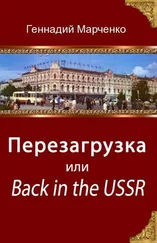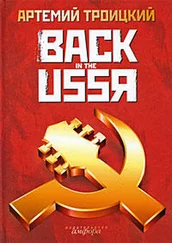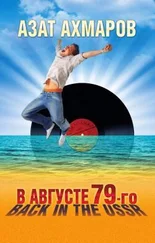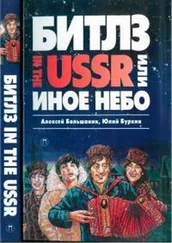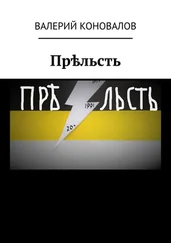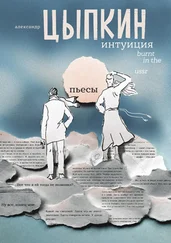I begin to suspect that something is not right at all. I go into the toilet and pull the chain over and over again. Despite the noise of the water I can still hear the conversation on the other side of the wall.
‘Delirium tremens! The dt’s!’ Running into the kitchen I pull out my emergency supply but it doesn’t help. The Voronins have started to sing. An opera is coming from the other side of the wall. Voronin is singing solo in a bass voice:
From wall to wall with his mug
he runs and listens…
“ He hears nothing! ” a chorus of his relations responds.
It is music from Carmen . I laugh as tears run down my cheeks. Why the hell does it have to be opera? I’m an ignoramus where music is concerned. My only visit to the opera was a reward for washing our bedroom floor in Riga. I block my ears but the voices do not stop. But — if I know I’m hallucinating I haven’t completely lost control over myself. I have to do something, so I dress and go outside. It’s three in the morning. At the approach of a car I break into a sweat. A dog’s bark makes my scalp tingle and tighten in terror, but I press on and manage to reach the first aid post on the main road.
They put me in an ambulance and drive me to the psychiatric hospital at Komsomolsk. Two nurses escort me through the foyer, weaving around male and female patients who are waltzing like somnambulists to the strains of The Blue Danube . I laugh till my stomach aches.
I am treated by a Doctor Djmil who convinces me that my visions of the last few days have been nothing more than products of my imagination. Except for the dancers, who were real and part of the Doctor’s attempts to give his patients a sense of normality.
I calm down, although I crave a drink. After three days I discharge myself, thinking the best thing to do will be to start work as soon as possible. But my empty flat haunts me with reminders of my family. I run away, seeking out friends who drink.
Two weeks later I return and spend the whole night sweeping up little black devils who have taken over the flat in my absence. There are several hundred of them, about the size of mice, running about the floor thumbing their noses at me and sticking out their tongues. They tease me for imagining my neighbour with a gun. I’m not afraid of them for they seem more mischievous than evil. I take a mop and briskly herd them into the corner so I can crush them all at once. I work as diligently as a woman mopping up spilled water. The task takes all night, for as soon as I have swept the devils into one corner they jump over the mop and run squealing across the floor again.
When my strength gives out I sit down on the bed for a cigarette. The devils run up my trouser legs to my knees, tickling me with their tails. Pulling up my trousers I flick them off onto the floor like cockroaches. But I can bear it no longer and run from the house. I wander all night until my legs bring me back to the hospital. Djmil looks into my eyes and orders me to get undressed. He gives me a massive dose of aminazine and I finally fall asleep.
Half the people in my ward are alcoholic and the rest insane. The alcoholics are treated with Antabuse. However we know that all medicines are poisonous and it is rumoured that Antabuse diminishes potency, so everyone tries to avoid swallowing their tablets. We hide them in our cheeks and then spit them into the toilet.
The first person I meet on the ward is Ivan Shirmanov. A habitual patient in the hospital, he shows me around, telling me not to be scared of the lunatics. Like every supposedly normal person, I am wary of them, but I discover they are not frightening, simply unfortunate. In the course of my life I have met enough people who could pass for psychiatric patients, while some of the hospital’s inmates wouldn’t be out of place in the corridors of power.
One of the patients has the apt name of Vodkin. He was a chauffeur until drink addled his brain so much he forgot the number of the car he drove. In order not to confuse it with another he would leave the starting handle in when he parked it. Vodkin’s colleagues used to take the starting handle and put it in another vehicle. Vodkin would then spend hours trying to start the wrong car. Eventually he was sacked and sent to hospital.

The nurses take away Vodkin’s pyjama bottoms to prevent him getting out of bed, but he manages to pinch someone’s dressing-gown and wanders into the smoking-room where the alkies are gathered. His passion is draughts. Despite his imbecility he always wins so no one wants to play with him. To distract him from the board someone asks him to sing, kicking up his heels in a peasant dance Vodkin roars:
We spent the night in Samara
With the MVD
They hit us on the neck
We won’t tell anybody!
To encourage him we all join in with the chorus: The storm raged, the lightning flashed … until an orderly comes to take Vodkin away and tie him to his bed.
I would do anything to escape the horror of the dt’s so in the end I agree to take Antabuse. However, my previous experience has made me sceptical of the treatment. Dr Djmil lends me some books by famous psychiatrists but these only feed my doubts. “Doctor,” I tell him, “I have concluded that Antabuse is an unnecessary element in the cure for alcoholism. It works on the basis of fear rather than physiological fact. People who think they’re going to die if they drink on top of Antabuse probably will die. It all depends on your state of mind. Antabuse won’t work on me any more as I’ve stopped believing in its effect.”
Djmil listens to my argument attentively, frowns and says: “Vanya, please don’t discuss this with the others. Come with me.”
He takes me through the wards, pointing at drooling imbeciles.
“That is your future if you continue to drink.”
But scare tactics do not work with me.
During my stay at the hospital Djmil tells me about his passion for mountain-climbing. Like many members of the provincial intelligentsia, he understands very well the putrid nature of the society in which we live. He has found a hobby that takes him temporarily beyond the confines of our human world into a battle with the elemental forces of nature. I remember our geography teacher at school and his passion for hiking.
My leg prevents me from hiking or climbing, so I can’t follow the path of Djmil and others like him. Other members of the intelligentsia go the way of Sedoy and it looks as though I’m heading in that direction too, not that I consider myself a member of the intelligentsia.
I decide there is nothing more the hospital can do for me, and discharge myself. My first priority is to find Olga and Natasha. Ludmila steadfastly refuses to reveal their whereabouts although I pester her every day. Finally I spot a letter in her box on the ground floor. Pulling it out, I recognise my wife’s handwriting. There is no return address on the back but I manage to decipher the postmark: Estonia. I go home and check the atlas — three Estonian towns have ‘mining’ symbols beside them.
The next morning I haul our washing-machine down to the yard by the rubbish bins and sell it to a passing driver. I buy a ticket to Estonia and set off on the 2,000-kilometre journey, fortifying myself on the way with beer.
After three days I alight from the train at the town of Kivyili, the nearest of the three mining towns. It is five in the morning. I take the first bus to the far side of town to begin my search. I could go to the public health centre but I don’t want to embarrass Olga if she turns out to be working there. After my drunken journey I look repulsive.
Читать дальше
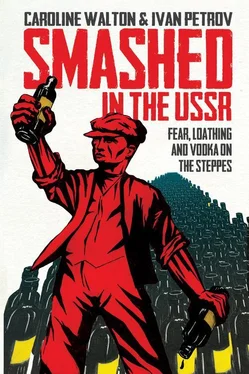

![Геннадий Марченко - Перезагрузка или Back in the Ussr. Книга 1. [СИ]](/books/53319/gennadij-marchenko-perezagruzka-ili-back-in-the-uss-thumb.webp)
